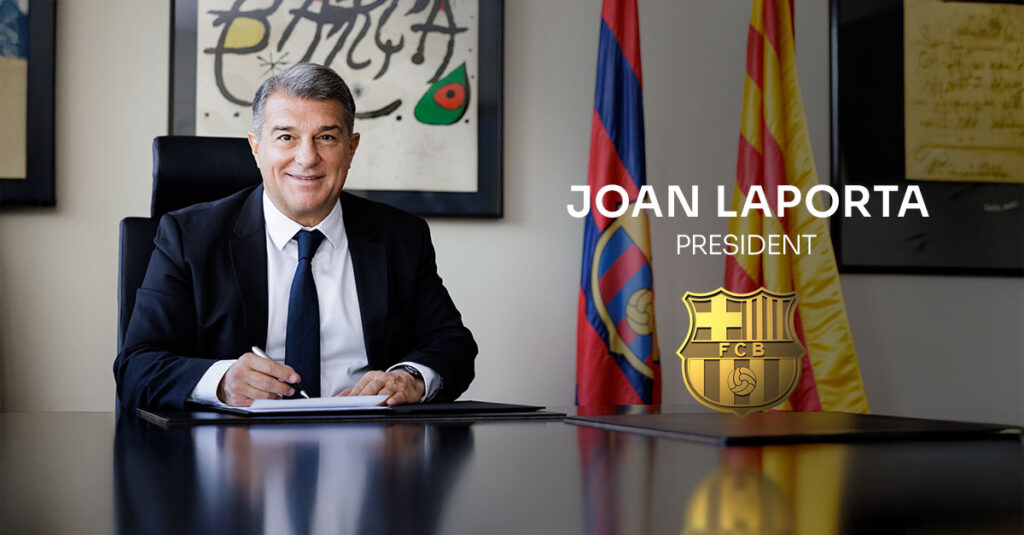Joan Laporta, President of FC Barcelona, tell us how the Club created a dedicated Sustainability Department—allowing professionals from the different areas of the Club introduce innovative processes.
Yes. With the arrival of the new Board of Directors in 2021, which I have the honour of presiding over, the Club created a dedicated Sustainability Department. Even so, the transversal nature of sustainability required the creation of a Sustainability Committee, allowing professionals from the different areas of the Club involved in these matters to participate, share perspectives and needs, implement efficient management, and introduce innovative processes that add value to our institution while ensuring both the reduction of environmental impact and the social awareness that define the Club.
“In 2021, FC Barcelona created a dedicated Sustainability Department.”
It is important to note that the Club is a private, non-profit association of individuals with its own legal personality. It does not have a Board of Directors in the corporate sense, but rather an Executive Board.
As a Club that holds periodic elections—currently every five years—in which all members may vote, governance has always been a fundamental principle.
In this regard, the Sustainability Committee brings together Club professionals responsible for sustainability to implement a management model that is responsible, transparent, and respectful of its surroundings, both environmentally and socially. Decisions taken within the Committee and on sustainability matters are reported directly to the Office of the President.
Yes. The Club has adopted a Strategic Plan built upon three pillars, one of which is Sustainability, understood in a broad sense.
Due to its transversal nature, it involves the participation of various departments, which incorporate it into their projects and initiatives. Likewise, internal and external stakeholders are increasingly demanding a firm and measurable commitment to sustainability.
In terms of environmental sustainability, I would highlight two major circular-economy projects we have already carried out—one focused on waste and the other on water—which demonstrate that our commitment extends beyond the present and will form part of the legacy we leave to future generations.
During the construction of the new stadium, we preserved and rehabilitated the first and second stands, respecting the architectural heritage and reducing the use of new materials and energy. For the construction of the new third stand, we reused all of the reinforced concrete from the previous structure—over 120,000 tonnes—making it one of the largest circular-economy operations ever undertaken in the construction sector.
We installed a treatment plant across the street on the site of the former Miniestadi, creating a zero-kilometre initiative where new low-emission cement was also produced. This has resulted in a reduction of nearly 50% in the carbon footprint associated with building the new stadium.
“100% of the electricity consumed by the Club comes from renewable sources, as certified by Guarantees of Origin.”
Regarding water consumption, we have made significant investments in infrastructure to use regenerated water from nearby treatment plants, ensuring irrigation of artificial-turf pitches during drought periods. Likewise, we have built three underground tanks in the new stadium to collect rainwater; once the stadium is completed, these tanks will supply the irrigation of landscaped areas.
Finally, in the field of energy, 100% of the electricity consumed by the Club comes from renewable sources, as certified by Guarantees of Origin. Our objective is to achieve self-consumption, which will be possible once the solar panels are installed on the roof of the new Spotify Camp Nou. All these actions will transcend our mandate and become part of the Club’s long-term assets.
The Club closely follows the regulatory developments proposed by the European Commission and their transposition into the legislation that directly affects us.
I would like to emphasise that FC Barcelona is not a commercial company—unlike some other sports entities—so parts of this regulation apply to us differently. Even so, we continue to produce the reports that form the basis of our sustainability work, such as the annual sustainability report and both simple and double materiality assessments.
“The Club closely follows the regulatory developments proposed by the European Commission.”
We would welcome progress toward European legislation that sets clear and stable criteria with comparable indicators across the EU and simplifies administrative requirements.
In our view, such measures would help unify standards and accelerate the environmental transition toward achieving the greenhouse-gas reduction targets set in the Paris COP and the Zero Waste objectives, within reasonable timeframes and aligned with EU commitments.
For any organisation or company, obtaining certifications validates the actions undertaken, dispels doubt, and enhances reputation by improving transparency. In our case, it reinforces our commitment and responsibility to our members and to society—locally, nationally, and globally—and aligns fully with our identity as Més Que Un Club.
As for the construction of the new Spotify Camp Nou—an essential component of the Espai Barça project—it is being certified simultaneously under both LEED and BREEAM. It is also worth noting that, in the management of goods and services, we have obtained double Biosphere certification—for the Club and specifically for our Museum—for the third consecutive year.
Likewise, some of the specific events hosted at our facilities, such as the General Assemblies, are also certified.
We thank Joan Laporta, President of FC Barcelona, for sharing his vision and experience.
Joan Laporta, President of FC Barcelona, tell us how the Club created a dedicated Sustainability Department—allowing professionals from the different areas of the Club introduce innovative processes.
